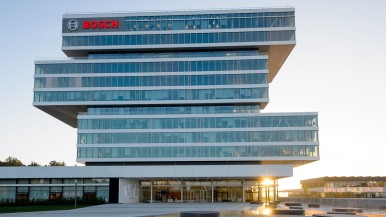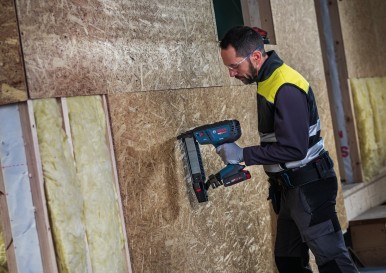Stuttgart – Every morning at 7:30 a.m. sharp, a truck leaves the Bosch plant in Homburg. It travels to a number of suppliers in sequence, all located within a 60 kilometer radius of the plant, picking up goods that Bosch requires to manufacture hydraulic components. Knowing whether the truck has reached all its stops on time, whether it is stuck in traffic, or whether the loading process is behind schedule is important for the material and transportation planners at the plant. They are responsible for ensuring that goods are available for the Homburg production lines on time and according to requirements. “Thanks to the IT platform and new mobile app we developed for truck drivers as part of the ProveIT research project, material and transportation planners can monitor the plant’s entire supply chain and know how to respond if there is a disruption,” says Dr. Markus Bauer, program manager for logistics IT at Bosch. “Using the app, the driver records all important incidents: departure time, arrival, the beginning and end of a loading process, onward departure, and delays in transit. This real-time data is pooled and made available on the ProveIT platform.” Bauer headed up the three-year research project ProveIT (production plan-based recovery of vehicle routing plans within integrated transport networks), which aimed to create a system for the smooth operation of connected logistics chains. In addition to Bosch, six further companies and institutions took part in the publicly funded project, which has now been successfully completed, with tangible results. Besides the ProveIT platform and the app for truck drivers, these include services for material and transportation planners.
About Bosch
The Bosch Group is a leading global supplier of technology and services. It employs roughly 418,000 associates worldwide (as of December 31, 2024). The company generated sales of 90.3 billion euros in 2024. Its operations are divided into four business sectors: Mobility, Industrial Technology, Consumer Goods, and Energy and Building Technology. With its business activities, the company aims to use technology to help shape universal trends such as automation, electrification, digitalization, connectivity, and an orientation to sustainability. In this context, Bosch’s broad diversification across regions and industries strengthens its innovativeness and robustness. Bosch uses its proven expertise in sensor technology, software, and services to offer customers cross-domain solutions from a single source. It also applies its expertise in connectivity and artificial intelligence in order to develop and manufacture user-friendly, sustainable products. With technology that is “Invented for life,” Bosch wants to help improve quality of life and conserve natural resources. The Bosch Group comprises Robert Bosch GmbH and its roughly 490 subsidiary and regional companies in over 60 countries. Including sales and service partners, Bosch’s global manufacturing, engineering, and sales network covers nearly every country in the world. Bosch’s innovative strength is key to the company’s further development. At 136 locations across the globe, Bosch employs some 87,000 associates in research and development.
The company was set up in Stuttgart in 1886 by Robert Bosch (1861–1942) as “Workshop for Precision Mechanics and Electrical Engineering.” The special ownership structure of Robert Bosch GmbH guarantees the entrepreneurial freedom of the Bosch Group, making it possible for the company to plan over the long term and to undertake significant upfront investments in the safeguarding of its future. Ninety-four percent of the share capital of Robert Bosch GmbH is held by Robert Bosch Stiftung GmbH, a limited liability company with a charitable purpose. The remaining shares are held by Robert Bosch GmbH and by a company owned by the Bosch family. The majority of voting rights are held by Robert Bosch Industrietreuhand KG. It is entrusted with the task of safeguarding the company’s long-term existence and in particular its financial independence – in line with the mission handed down in the will of the company’s founder, Robert Bosch.
Additional information is available online at www.bosch.com, www.bosch-press.com.







